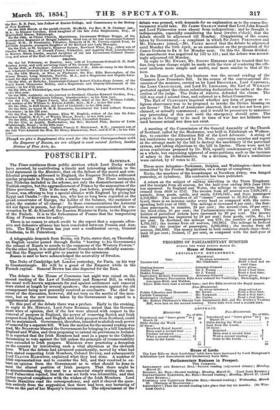The debate in the House of Commons last night was
raised on the second reading of the Law of Settlement and Removal Bill, in which the usual well-known arguments for and against settlement and removal were stated at length by several speakers ; the arguments against the old arrangement being now generally received as concusive. The chief in- terest of the discussion, however, did not turn on the merits of the mea- sure' but on the new course taken by the Government in regard to a supplemental question. To this part of the debate there was a preface. Early in the evening, in reply to Mr. HENLEY, Lord JOIIN RussELL stated that the Govern- ment were of opinion, that if the law were altered with respect to the removal of paupers in England, the power of removing Scotch and Irish paupers from England, and English and Irish paupers from Scotland, could not be maintained. Government, therefore, intended to abolish such power of removal by a separate bill. When the motion for the second reading was read, Mr. STAFFORD blamed the Government for bringing in a bill limited to England and Wales, and then proposing to extend its provisions to Ireland. It is reported that the Irish Members had sent in a paper to the Cabinet threatening to vote against the bill unless the principle of irremoveability were extended to Irish paupers. Ministers were practising a deception on the country by introducing such a vital alteration at the eleventh hour. When the debate had advanced considerably, moved by what had been stated respecting Irish Members, Colonel Dcznan, and subsequently Lord CLAUDE Hamwroir, explained what they had done. A number of Irish representatives met to consider the bill, and they resolved to ex- tract an opinion from the Government as to what should be done to meet the altered position of Irish paupers. That there might be no misunderstanding, they sent in a memorial simply stating the case. I.ord Palmerston replied, that the case set forth was irresistible, and that justice required compliance with the wishes of the Irish Members. Lord Claude Hamilton read the correspondence, and said it cleared the ques- tion entirely from the supposition that there had been any bartering of ?cotes on the part of her Majesty's Government. The adjournment of the
debate was pressed, with demands for an explanation as to the course Go-
vernment would take. Sir Jsmais GRAHAM stated that Lord John Russell and Lord Palmerston were absent from indisposition ; and he thought it
indispensable, especially considering the hour (twelve o'clock) that the
debate should be adjourned till Monday. Complaining of the course taken by Government,—a complaint in which Sir IOUs PAKINGTON and Mr. DISRAELI joined,—Mr. PACKE moved that the debate be adjourned until Monday the 24th April, as an amendment on the proposition of Sir James Graham to fix it for Monday next. On this the House divided : the amendment was negatived by 132 to 121; and the debate was accord- ingly adjourned till Monday. In reply to Mr. DWART, Mr. SIDNEY HERBERT said he trusted that be- fore long some change might be made with the view of rendering the offi- cers' uniform more simple and useful, and more similar to that of the men.
In the House of Lords, the business was the second reading of the Common Law Procedure Bill. In the course of the conversational dis-
cussion of the measure, can-led on by Lord Bum:Guam, Lord CAMPBELL, the LORD CHANCELLOR, and Lord ST. LEONARDS, the Earl of WICKLOW protested against the clause substituting declarations for oaths at the dis- cretion of the judge. The Duke of ARGYLL defended the clause. The bill was read a second time, and referred to a Select Committee. The Earl of CLANCARTY inquired whether any form of prayer or re- ligious observance was to be proposed to invoke the Divine blessing on our forces ? The Earl of ABERDEEN observed, that war has not been pro- claimed, or actually commenced ; and it would be premature to announce any proceeding of this sort until the emergency should arise. The prayer in the Liturgy to be used in time of war has not hitherto been used because actual war does not exist.


































 Previous page
Previous page